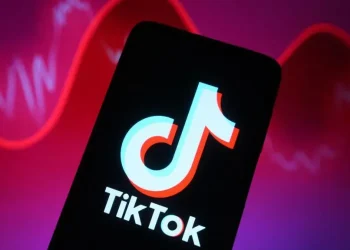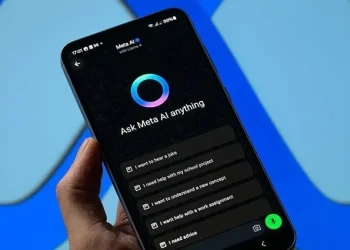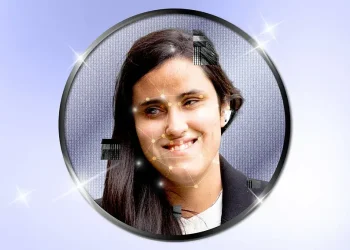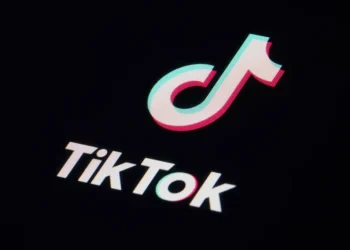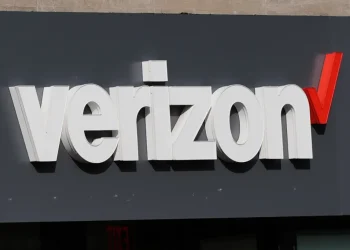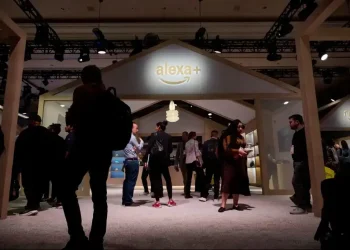Vogue’s AI model ad in Guess campaign stirs controversy over beauty standards
July 27, 2025 – 9:16 AM
A digitally generated model featured in a recent Guess advertisement published in Vogue has ignited controversy across the fashion industry and social media. While the ad signals the growing role of artificial intelligence in fashion marketing, it has also drawn criticism for promoting unrealistic beauty ideals and threatening diversity and job opportunities within modeling.
AI model debuts in Vogue’s August edition
In the August 2025 print edition of Vogue, a full-page ad for Guess showcases a striking blonde model wearing items from the brand’s summer collection. The image appears lifelike at first glance, but a small caption in the corner reveals the truth: the model is not a person at all but a product of artificial intelligence.
The ad, developed by AI creative firm Seraphinne Vallora, marks the first appearance of an AI-generated figure in the magazine. Although Vogue clarified that the ad was not part of its editorial content, its inclusion in such a prominent fashion publication has triggered a global debate.
How the AI model was created
Seraphinne Vallora was co-founded by Valentina Gonzalez and Andreea Petrescu, who told the BBC that Guess co-founder Paul Marciano contacted them via Instagram to collaborate on a summer campaign. They created 10 initial AI model drafts—five brunettes and five blondes—before settling on the final two, which included the blonde featured in the ad.
The process, they explain, is far from instantaneous. Creating a fully realized AI model can take weeks and involves a team of five employees. The duo says their pricing for high-profile clients like Guess can reach the low six-figure range.
Despite the sophistication behind the ad, the backlash highlights growing concerns about the future of real models—and the kinds of beauty standards these virtual creations may promote.
Critics: ‘Lazy, disheartening, and harmful’
Longtime plus-size model Felicity Hayward condemned the ad, calling the decision to use AI models “lazy and cheap.” She speculated that Guess may be attempting to generate buzz or cut production costs without considering the wider implications.
“It feels like a step backwards,” Hayward said, noting the fashion industry’s recent retreat from the strides made in diversity during the 2010s. She worries that AI-generated images will disproportionately hurt plus-size and marginalized models who already struggle for representation.
Vogue’s decision to print the ad was especially concerning to her: “Very disheartening and quite scary.”
Diversity and realism still lacking in AI fashion
While Seraphinne Vallora insists its models are not meant to set unattainable standards, the company acknowledges that their Instagram posts featuring diverse or plus-size AI models often receive far less engagement.
“We’ve posted AI women with different skin tones, but people just don’t engage,” Gonzalez told the BBC. “As a business, we use what sparks conversation and attracts clients.”
The firm has yet to fully explore plus-size AI models, citing technological limitations. However, critics argue this lack of inclusion only perpetuates outdated ideals of beauty.
Dove campaign highlights AI beauty bias
A 2024 campaign by Dove shone a light on the biases embedded in AI-generated imagery. When asked to create the “most beautiful woman in the world,” an image generator produced nearly identical results: slim, blonde, and white. The resemblance to the Guess AI model was striking—and intentional.
Dove’s ad served as a cautionary message about the risks of using AI in visual media without thoughtful inclusion or transparency. Mental health advocates have echoed similar warnings.
Psychological impact and body image concerns
Experts fear that the use of hyper-realistic AI models could further damage body image, especially among young people.
Vanessa Longley, CEO of eating disorder charity Beat, expressed concern about the ad’s influence: “If people are exposed to images of unrealistic bodies, it can affect how they see themselves. Poor body image increases the risk of developing an eating disorder.”
Because these models are not real people, they are immune to human imperfections—making their appearance even more unattainable than that of traditional models whose images may be airbrushed or Photoshopped.
Transparency and regulation still lag behind
Another issue is the lack of clear labeling. While Guess did indicate the image was AI-generated, the notice was subtle and easy to miss.
Tech entrepreneur and former model Sinead Bovell, who previously wrote about AI in fashion for Vogue, called the lack of transparency “exceptionally problematic.” She warned that AI-generated faces could cause confusion and set even more unrealistic expectations.
“There are young girls getting surgery to look like filtered faces,” Bovell said. “Now we’re seeing people who were never real to begin with.”
Currently, the UK does not require AI-generated content in advertising to be labeled by law.
Impact on jobs and the fashion industry
Beyond consumer psychology, the use of AI may also affect employment within the fashion sector.
Sara Ziff, founder of the Model Alliance, pointed out that a photoshoot involves more than just a model and a photographer. From stylists to makeup artists, many professionals depend on traditional campaigns for work. Ziff argues that while AI isn’t inherently exploitative, it can be used in ways that sideline human workers.
“AI can offer benefits,” she said, “but we need protections in place to support those working behind the scenes.”
Guess defends the campaign: AI as a marketing supplement
Gonzalez and Petrescu pushed back against claims that AI models are replacing real people. They argue their technology supplements traditional modeling rather than replaces it.
They also note that real models are still part of the process—used to help understand how clothing fits and moves in real life before generating the AI version.
Despite that, Seraphinne Vallora’s website highlights cost-efficiency as a key benefit, noting that AI campaigns “eliminate the need for expensive set-ups, makeup artists, venues, travel, and model fees.”
Industry response and the future of fashion models
Online reaction to Vogue’s decision has been sharp. One user on X (formerly Twitter) posted, “As if beauty expectations weren’t unrealistic enough—now AI is making them impossible. Even real models can’t compete.”
Critics say Vogue’s choice to run the ad gives legitimacy to AI modeling. As Bovell puts it, “Vogue is seen as the Supreme Court of the fashion industry. When they feature an AI ad, it’s like they’ve ruled it acceptable.”
Still, some experts see a future where AI models coexist with real ones, offering personalization and interactive experiences. Bovell predicts that consumers may eventually be able to create AI avatars of themselves to virtually try on clothes—blurring the lines between tech and fashion in a potentially empowering way.
Conclusion: AI in fashion raises innovation vs. ethics debate
The Guess AI ad in Vogue has ignited a meaningful conversation about where fashion—and society—goes from here. As brands embrace technology to innovate and reduce costs, questions about transparency, inclusivity, mental health, and labor rights will remain central.
The modeling industry may be evolving, but the debate over beauty standards and the ethics of AI-generated figures is far from settled.
Source BBC – Does this look like a real woman? AI Vogue model raises concerns about beauty standards
This article was rewritten by JournosNews.com based on verified reporting from trusted sources. The content has been independently reviewed, fact-checked, and edited for accuracy, neutrality, tone, and global readability in accordance with Google News and AdSense standards.
All opinions, quotes, or statements from contributors, experts, or sourced organizations do not necessarily reflect the views of JournosNews.com. JournosNews.com maintains full editorial independence from any external funders, sponsors, or organizations.
Stay informed with JournosNews.com — your trusted source for verified global reporting and in-depth analysis. Follow us on Google News, BlueSky, and X for real-time updates.

